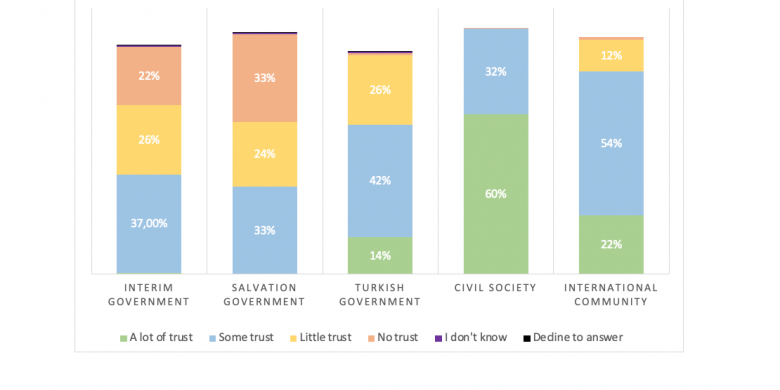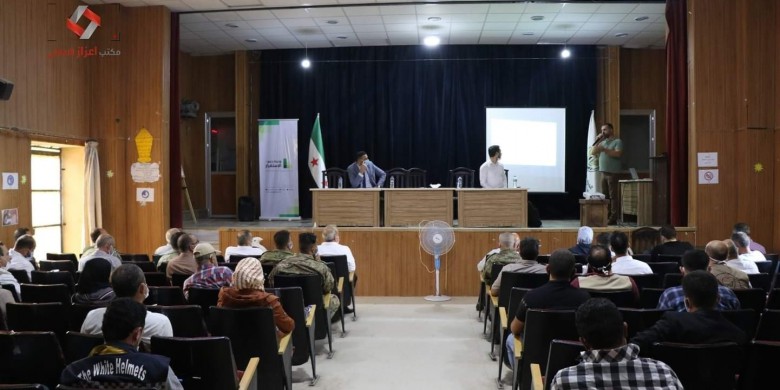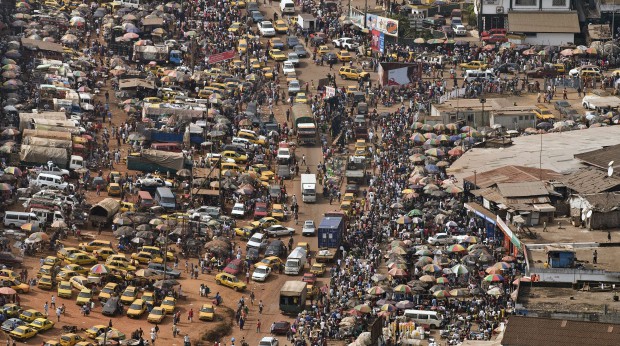
Political Trust at a Time of Pandemic
“Local Voices at a Crossroads” is an article series in which local actors of everyday peace share their insights into the fragilities and resilience of their societies in the face of conflict. Grassroots societies lie at the crossroads between local realities and national peacebuilding policies and practices. The series therefore aims to accelerate action at the local level by strengthening the voices of civil society at the policy level. “Local Voices at a Crossroads” is hosted by the Civil Society Platform for Peacebuilding and Statebuilding (CSPPS) and emerged from a collaboration with the Political Settlements Research Programme (PSRP*), based at the University of Edinburgh.
In Syria, like in other conflict-affected countries, the COVID-19 pandemic added another layer of vulnerability and uncertainty. Several reports pointed to COVID-19 as a threat multiplier, exacerbating existing fragilities and grievances and posing long-lasting challenges to durable peace. Yet, it is not easy to single out the impact of the pandemic on pre-existing vulnerabilities. This is all the more so the case in Syria, which entered its tenth year of conflict in March 2021. Recognizing the importance to shed light on the COVID-19-peace-conflict nexus, we asked 50 residents in opposition-held areas in northwest Syria how the outbreak of the pandemic affected their perceptions of key governmental actors, and how these perceptions reversely affected their response to the virus.
Mistrust in Governmental Actors
In our previous story “The Politics of the COVID-19 Pandemic in Syria”, we looked back at the competition between Syrian governmental actors over the COVID-19 file. The latter was commonly seen by the Syrian government and the two de facto governments in the opposition-held areas – the Interim government in Idlib and the Salvation government in Aleppo – as an opportunity to attract external funds and gain international legitimacy. Despite their apparent interest in managing the pandemic, the lack of engagement of these governmental actors to effectively mitigate the impact of COVID-19 and to reach vulnerable communities further damaged their image inside Syria.
Strained state-society relations and mistrust pre-existed the COVID-19 pandemic. Indeed, governmental actors across Syria are also key conflict actors, and their reputation was recurrently and generally damaged by their lack of governmental capabilities, latent corruption, and involvement in violent policies. It comes as no surprise that 65% of respondents we interviewed put little to no trust in the Interim government, while the number peaks to 80% in the case of the Salvation government (see table below: To what extent do the trust the response of the following actors to the COVID-19 pandemic in northwest Syria?*)

Perceptions are more nuanced when it comes to the Turkish government, which is strongly involved militarily and politically in western and northern Aleppo governorate. More than 40% of the respondents we interviewed in these areas put some trust in the Turkish neighbor, which attracted a lot of trust in only 5 cases. Despite its violent military offensives against elements of Islamic State (IS) and the Kurdish PKK in northern Syria from 2016 to 2019, Turkey played an essential role during the pandemic. Through its health directorates and its cooperation with Syrian local councils in areas under the control of the Interim government, Turkey largely controlled the COVID-19 response and imposed strict mitigation measures. Even before the pandemic, Turkey equipped most hospital and medical centers affiliated with the Turkish Health Ministry, and it provided medical services in more isolated, rural areas. While this positive role must be nuanced by the marginalization of (I)NGOs under heavy Turkish supervision and slow bureaucracy, it surely accounts for the relative trust placed in Turkey compared to other governmental actors in Syrian opposition-held areas. Finally, during the pandemic, Turkey remained the only point of entry for UN agencies and essential medical supplies to Syrian opposition-held areas through the Bab al-Hawa border crossing in the northwest of the country, after the UN failed to renew its mandate on other crossings in July 2020 due to a Russian veto.
Deprived of independent state structure and support, 90% of the participants we interviewed trusted and relied on local civil society and their close circles to provide protection and to mitigate the impact of COVID-19.

Conspiracy Theories and Misinformation
Political competition over the COVID-19 file by the high number of governmental actors in Syria resulted in the multiplication and inconsistency of discourses on the pandemic. Moreover, the lack of independent media and pressure on alternative voices in northwest Syria reinforces mistrust in official information on the pandemic. As a result, Syrian residents in opposition-held areas rely mostly on social media – considered the only independent media source – and their close circles to keep informed and updated about COVID-19. Over-reliance on these non-expert sources of information has only accelerated the spread of rumors and inaccurate news.
In Idlib governorate, which is home to more than four million people, the Salvation government is affiliated to the Salafi-jihadi group Hayat Tahrir al-Sham. The response to COVID-19 thus featured a religious element. The government engaged religious clerics and preachers to educate their congregants on the virus and to echo the official discourse. The Salvation government also created a weekly YouTube show called “Corona and Sharia” and distributed Zakat (compulsory contribution to charity) to the most vulnerable residents. Yet again, the shadow of Hayat Tahrir al-Sham and the mistrust in the Salvation government, in addition to the latter’s lack of capacity and effective control over all Idlib governorate, prevented solidarity with official mitigation measures. This gave a platform to other, independent religious voices in Idlib and Aleppo governorates. General confusion on the COVID-19 pandemic therefore grew, especially when some of these other religious clerics suggested that the virus was a lie and a conspiracy against Islam used to forbid prayers and pilgrimage. Similar theories spread across the world through social media when clerics stressed that Muslims were immune to the virus and that the vaccine would turn Muslims into unbelievers.
“A decade of war did not kill us; we are stronger than the people outside Syria so why should we be afraid of the virus?”
All in all, mistrust, misinformation and the multiplication of sometimes contradictory discourses on the COVID-19 pandemic had an adverse impact on the way grassroots communities responded to the virus. The great majority of the population in opposition-held areas adopted reckless behaviour, negligence and refusal to take mitigating measures seriously. As explained by one of the residents we interviewed: “A decade of war did not kill us; we are stronger than the people outside Syria so why should we be afraid of the virus?”.
Awareness Campaigns and Bridge Building
Mistrust in governmental actors and information about COVID-19 are the greatest challenges to protect Syrian communities in opposition-held areas, in addition to difficult access and reduced peacebuilding efforts. Deprived of independent state structure and support, 90% of the participants we interviewed trusted and relied on local civil society and their close circles to provide protection and to mitigate the impact of COVID-19. While the pandemic brought local civil society to the forefront of conflict management in northwest Syria, it also affected the nature of its missions. In addition to distributing aid, local civil society became a key transmission channel to fight misinformation and raise public awareness about the virus and mitigating measures via door-to-door and mobile campaigns. These campaigns are also the occasion to break isolation and provide educational and psychological support to residents. Medical services are free for all in opposition-held areas, but people must be willing to visit hospitals and medical centers. More specifically, they must trust the institutions and the people delivering these medical services.
The long-term implications of COVID-19 on political and social cohesion and trust – among other conflict dynamics – stress the need to integrate peacebuilding efforts towards sustainable peace into all COVID-19 responses.
An unprecedented decline in violence and military confrontations followed the outbreak of the COVID-19 pandemic in Syria. Whilst this certainly offers perspective, the pandemic does also continue to interact with other underlying conflict dynamics, pre-existing grievances and frustrations. In the first instance, the pandemic has thus prompted a reorientation of peacebuilding efforts towards immediate redress, and protection of the most vulnerable communities. Nonetheless, the long-term implications of COVID-19 on political and social cohesion and trust – among other conflict dynamics – stress the need to integrate peacebuilding efforts towards sustainable peace into all COVID-19 responses.
_________________________________________________
Raise your voice! Contact us to share your or others’ experiences of vulnerability and resilience to conflict and efforts for peace.
Article written by Juline Beaujouan, Eyas Ghreiz and Abdulah El hafi
Juline Beaujouan is a Research Associate with the Political Settlements Research Programme (PSRP), based at the University of Edinburgh, where she researches local conflict management and trust-building in Lebanon, Iraq and Syria. Juline received her Ph.D from Durham University where she was awarded the al-Sabah doctoral fellowship and acted as a member of the AHRC’s Open World Research Initiative (OWRI). Juline is the co-editor and contributor to the volume Syrian Crisis, Syrian Refugees - Voices from Jordan and Lebanon, and co-author of Islam, IS and the Fragmented State: The Challenges of Political Islam in the MENA Region.
Eyas Ghreiz is a researcher and consultant in areas of human rights and development. Ghreiz is also a Master student in International Development, specialising in conflict, security and development, at the University of Birmingham, UK. Ghreiz has over eight years of working experience with international NGOs, and UN bodies in Jordan, Syria, Turkey and Yemen. He has published several articles in both Arabic and English and contributed to the book Syrian Crisis, Syrian Refugees: Voices from Jordan and Lebanon, published by Palgrave Macmillan in both English and Turkish, and will be published in Arabic soon.
Abdulah El hafi co-founded and managed the Unified Relief Office in Eastern Ghouta and sat on the board of directors for two years. In 2013, he was a founding member of the Civil Defense in Eastern Ghouta in Rif Damascus. From 2014 to 2019, Abdulah worked as a coordinator and field manager for several programs funded by the British DFID and USAID. He also delivers trainings in the field of good governance and capacity building for several local organizations, teams and councils in Rif Damascus, Idlib, and northern Aleppo governorates. Currently, Abdulah is working as the manager of the Local Administrative Councils Unit (LACU) Syria Office.
*The Political Settlements Research Programme is a partner of the Covid Collective. The Collective brings together the expertise of UK and Southern-based research partner organisations and offers a rapid social science research response to inform decision-making on some of the most pressing Covid-19 related development challenges. The PSRP and Covid Collective are supported by the UK FCDO.

